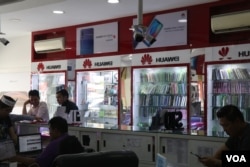One of Cambodia’s leading telecom companies on Monday held its first public testing of its fifth-generation (5G) Internet network with support from Huawei Technologies amid concerns and bans by the United States and some of its allies over the firm’s suspicious ties to the Chinese government.
For Cambodia “5G is really not far away,” said Thomas Hundt, chief executive officer of Smart Axiata, a Cambodia-based company owned by Malaysia’s Axiata Group Berhad.
He added that his firm is expected to launch the network in the country this year with investments of “hundreds of millions of dollars.”
“We still have a lot of work to do and to launch commercially—no doubt. But we will make sure we are pushing forward and empower Cambodia for the future of connectivity and digital lifestyles.”
The Cambodian government signed an agreement with Huawei Technologies in late April, allowing the Chinese firm to help the country build its 5G network.
The country—with 16 million people—registers some 20.4 million mobile subscriber-identity-module cards and 15.4 million Internet subscribers, according to the latest government statistics.
Huawei Technologies, the firm in question, recently found itself at the center of Sino-American trade war and confrontations with Washington and its allies accusing the firm of having links to the Chinese military and intelligence services.
The Trump administration moved to blacklist Huawei in May, banning U.S. firms from engaging commercially and technologically with the Shenzhen-based telecom company citing spying threats.
In Phnom Penh, the U.S. Embassy reacted to the 5G wireless network test with Huawei by encouraging Cambodia to regulate the latest generation of Internet network.
“It is critical that U.S. allies and partners maintain secure, reliable information and transportation networks,” embassy spokeswoman Emily Zeeberg told VOA Khmer in an email.
“We are concerned about Chinese influence over such infrastructure, and we discuss those concerns regularly with our allies and partners, including with our NATO allies. We are not alone in our concerns,” she added.
“We encourage Cambodia, as well as all our allies and partners, to include national security, including cybersecurity, as a key consideration in the evaluation of infrastructure-related projects.”
The London-based Daily Telegraph published a fresh damning report pointing to Huawei’s personnel data and finding that some of the firm’s employees were part of Chinese People’s Liberation Army and Ministry of State Security, the country’s leading spy agency.
Cambodia is using only around 50 percent of its current 4G network, said Moa Chakrya, who heads the Telecommunication Regulator of Cambodia.
The chief regulator said the country’s move to adopt the 5G network is “too early” as it is running behind on industrious automation, an Internet of Things, or smart devices to use the latest generation of a wireless network.
Asked about the U.S. concern on Huawei over spying, he said, “The Internet is never a secure thing … people can say anything but we could not make any comment yet since this is just a test.”
Moa Chakrya added that China’s ZTE and Finland’s Nokia are also seeking to build its 5G bases in the country, where up to four telecom companies are considering 5G expansion.
At the test event on Monday, Huawei Wireless Network’s chief technology officer Aaron Wang said his firm secured 50 contracts to operate 5G networks and shipped some 150,000 base stations worldwide.
“Huawei will always work together with Cambodia and Smart [Axiata] to build a fully connected and intelligent Cambodia,” said Aaron Wang.
But when asked about spying concerns Wang declined to comment.
Correction: An earlier version of this article incorrectly stated that Smart Axiata was pledging "hundreds of dollars" in its 5G network investment and described Aaron Wang as chief technology officer of Huawei. Smart Axiata's chief Thomas Hundt said the investment is worth "hundreds of millions of dollars." Aaron Wang is chief technology officer of Huawei Wireless Network, a part of Huawei Technologies.






